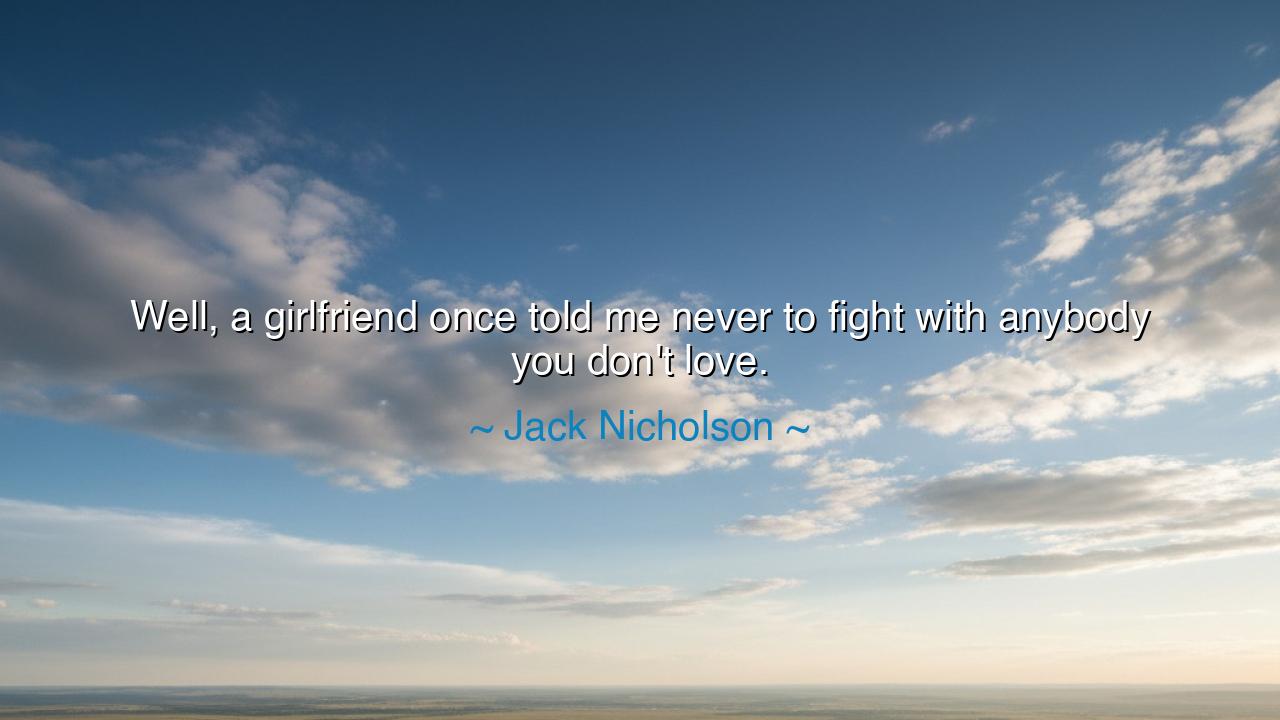
Well, a girlfriend once told me never to fight with anybody you






Hearken, children of the ages, to the words of Jack Nicholson, who speaks with the voice of reflection and counsel: "Well, a girlfriend once told me never to fight with anybody you don't love." Here lies a teaching of restraint, discernment, and the sacred wisdom of choosing one’s battles with care. Conflict, he reminds us, carries weight and consequence; it is the hearth of the heart, and should be ignited only when the bond of affection or respect endures.
Know that in these words there is both prudence and insight. To fight is to risk the spirit, to wound both self and other, and to disturb the fragile harmony of life. Nicholson’s lesson teaches that confrontation should be reserved for those whom the heart holds dear, for love is the measure by which understanding, patience, and forgiveness are possible. The ancients would counsel that battles untempered by love are empty, consuming the soul while yielding no lasting gain.
Yet, consider also the subtlety of affection. To love does not mean to avoid conflict entirely, but to approach it with respect, care, and intention. The wise know that disputes with strangers or those with no bond to the heart often breed bitterness and regret, whereas challenges within the sphere of love may foster growth, honesty, and the deepening of connection. Nicholson’s reflection is a reminder that love is both shield and guide.
And behold, there is heroism in restraint. To resist the urge to fight with the unconnected is to exercise courage, wisdom, and patience. It is to conserve the spirit for those battles where the heart and soul are intertwined, and where the labor of understanding and negotiation may yield profound fruit. Conflict, tempered by love, becomes the forge of enduring bonds rather than the fire of needless enmity.
Thus, remember, future generations: choose your confrontations with care, and let the measure of your affection guide the flame. To fight without love is to squander energy, to wound unnecessarily, and to invite chaos. To fight with love is to engage with courage, honesty, and the hope of understanding, preserving the sacred ties that bind hearts across time.
In the end, the ancients would say: let the heart govern the hand, and the bonds of affection guide the tongue. For true wisdom lies not in endless quarrels, but in the discernment to know when strife is meaningful, and when it is folly. To heed the counsel of love, as Jack Nicholson recalls, is to live with patience, honor, and a spirit attuned to the eternal rhythms of connection and care.






TLThao Le
This quote resonates with the idea of picking our battles wisely, but I wonder if it’s too simplistic. Can we really avoid conflict with everyone we don’t love, especially in professional or social settings? Sometimes, fighting for what’s right might mean engaging in a conflict with someone we don't have strong feelings for. How do we differentiate between unnecessary fights and important confrontations that could lead to growth or resolution?
TDNguyen Thi Dao
Jack Nicholson's girlfriend’s advice is interesting, but I can’t help but question: what happens when we are forced to confront someone we don’t love, like a colleague or a stranger? Do we simply walk away, or is there a point where it’s necessary to engage? Is avoiding conflict with those we don’t love the best approach, or is it better to face disagreements head-on, regardless of our emotional connection?
BTbinh tranthi
This quote speaks to the power of emotional attachment in conflict resolution. It makes me wonder – does love really make us less inclined to argue? Or is it possible that the people we love are the ones we argue with the most, because we care so deeply? Should we apply this advice universally, or are there circumstances when standing up for ourselves, regardless of feelings, is important?
NH05 -Tran Ngoc Ha-12a10
Jack Nicholson’s quote really made me think about the nature of conflict in relationships. Is it true that if we don’t care about someone, we shouldn't engage in arguments with them? It seems like a piece of advice that calls for us to focus our energy on meaningful relationships. But is it possible to avoid conflict altogether, or is it sometimes necessary to confront difficult situations, even with people we don’t love?